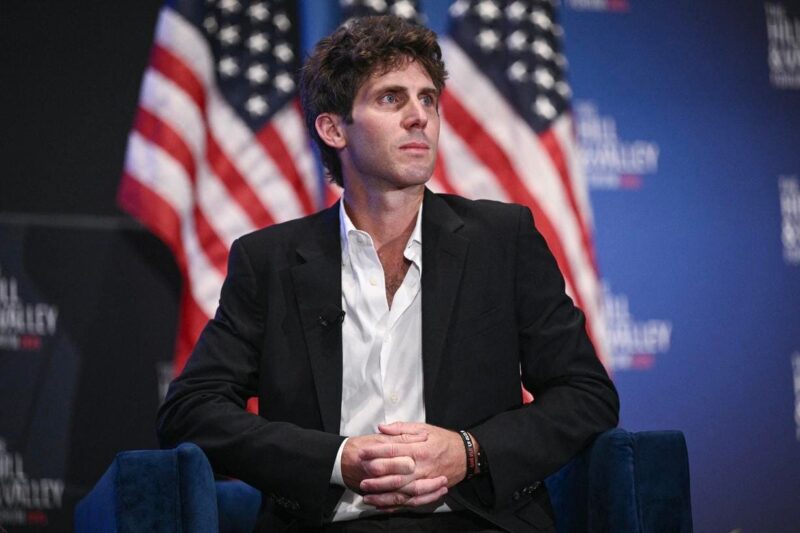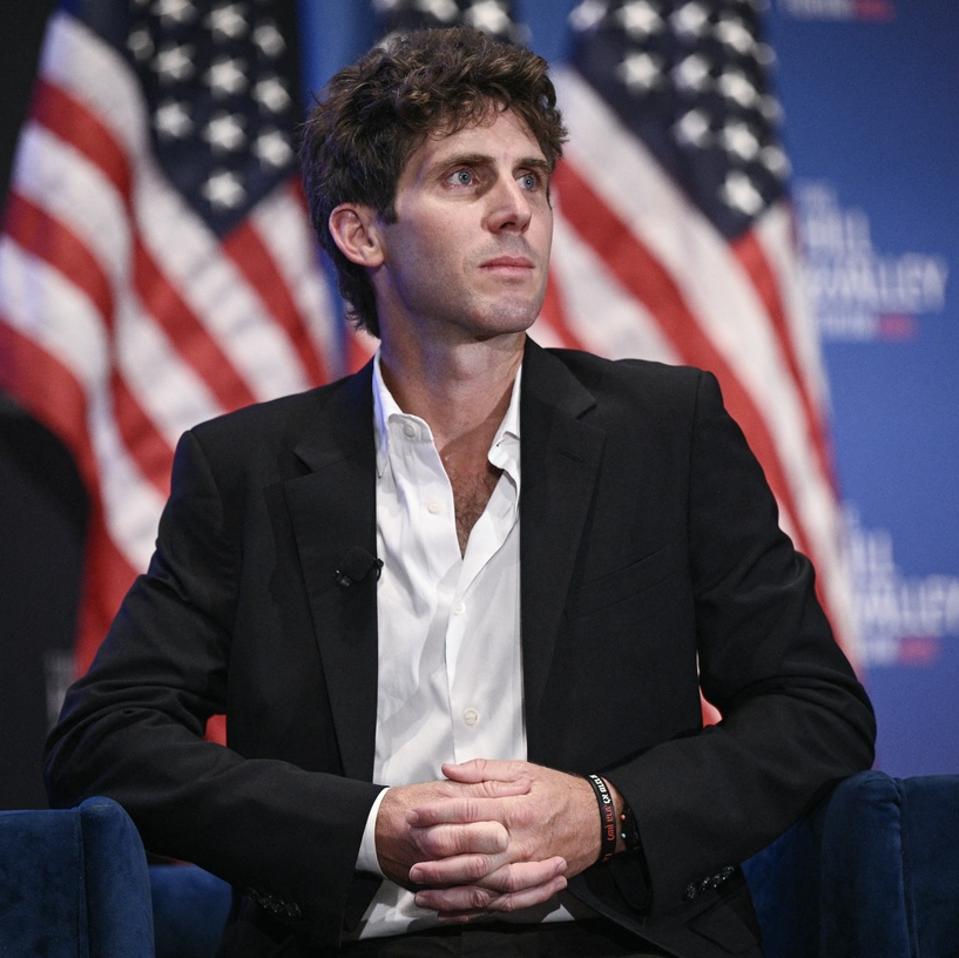When Sequoia partner Shaun Maguire posted tweets that many in the industry and civil-rights organizations condemned as Islamophobic, the venture-capital industry’s most powerful firm stayed silent. Days later, Sequoia COO Sumaiya Balbale — its most senior Muslim American executive — departed the firm. For a company that built its reputation on “long-term relationships and enduring values,” that silence spoke volumes.
Partner at Sequoia Capital Shaun Maguire speaks during the Hill & Valley Forum at the US Capitol Visitor Center Auditorium in Washington, DC, on April 30, 2025. (Photo by Brendan SMIALOWSKI / AFP) (Photo by BRENDAN SMIALOWSKI/AFP via Getty Images)
AFP via Getty Images
The Tweets Heard Around Sand Hill Road
Maguire’s comments, which labelled New York Assemblyman and Democratic nominee for Mayor of New York City Zohran Zohran Mamdani a “terrorist” for criticizing Israel’s actions in Gaza, triggered widespread backlash. Though he later deleted the tweets, screenshots circulated across the startup world — especially among founders and investors of color, many of whom privately voiced outrage.
Maguire’s posts accused Mamdani of “coming from a culture that lies about everything” and “advancing an Islamist agenda.” Critics — including hundreds of technologists as well as civil rights and faith-based advocacy groups — called the remarks Islamophobic because they conflated a Muslim public official’s heritage and faith with deception and extremism, echoing tropes long used to stigmatize Muslim communities.
Shaun Maguire’s controversial Islamophobic tweet about Mamdani
X
But Sequoia’s official accounts said nothing. No apology. No accountability. That silence became its own kind of statement.
The Context Behind the Tweets
Maguire’s widely criticized tweets in July 2025 followed a New York Times article resurfacing Mamdani’s 2009 Columbia University application, which listed his ethnicity as both “Asian” and “Black or African American.” Mamdani — who was born in Uganda to Indian parents, whose family had lived in East Africa for more than a century before immigrating to the U.S. — has said he checked both boxes to reflect his African birth and South Asian heritage.
Maguire accused Mamdani of coming from “a culture that lies about everything” and advancing an “Islamist agenda.” He later attempted to clarify that he meant Islamists, not Muslims in general, but the damage was done. In a 30-minute follow-up video posted to X, Maguire said he was “very, very sorry” to any Muslims “who aren’t Islamists,” emphasizing that only a small fraction of Muslims hold extremist views. Critics said the video failed to address the core issue — that his original comments had painted an entire culture as deceitful.
His broader posting history reinforced that perception. Maguire has previously called footage of dead Palestinian children “fake,” labeled the United Nations a “terrorist organization,” and reposted content from right-wing activist Laura Loomer, who has described herself as a “proud Islamophobe.” The Council on American-Islamic Relations (CAIR) later cited these examples as evidence of anti-Muslim animus.
Forbes reached out to Maguire, Mamdani and Balbale for comment. Maguire declined to elaborate beyond his public posts. A Sequoia spokesperson said the firm “does not comment on personnel issues.” Maguire declined to comment further. Mamdani and Balbale did not respond to requests for comment.
According to the Financial Times, Balbale’s exit — announced in August — followed Sequoia’s decision not to discipline Maguire.
The controversy unfolded in a highly charged political climate shaped by the Israel-Hamas war. Maguire, a self-described “Jew and Zionist,” has been vocal about rising antisemitism. Mamdani, a progressive legislator, has called for a cease-fire in Gaza and described Israel’s actions as genocide. Their clash became a proxy for broader ideological fault lines in Silicon Valley, where global politics increasingly shape boardroom identity.
Yet intent doesn’t erase impact. If Maguire insists he meant “Islamists, not Muslims,” it’s fair to ask: how would he react if someone claimed “Zionists, not all Jews, use deception to promote a Zionist agenda?” The parallel exposes the moral blind spot at the heart of the controversy: bigotry cloaked as ideology remains bigotry.
As Business Insider recently dubbed him, Maguire has emerged as “Silicon Valley’s most MAGA firebrand,” representing a larger cultural shift in venture capital — where ideological extremism and elite performance now coexist without consequence.
Parsing the Language: Hate Speech, Libel, and Islamophobia
Under U.S. law, “hate speech” is protected by the First Amendment but defined as expressions that vilify or incite hatred against a group based on race, religion, or ethnicity (American Bar Association, 2023). Libel is a false written statement presented as fact that harms a person’s reputation (Cornell Law School). Islamophobia, per the United Nations, is “fear, prejudice, and hatred toward Islam or Muslims manifesting in discrimination or stereotyping.”
Maguire’s language — asserting that Mamdani “comes from a culture that lies about everything” and is “advancing an Islamist agenda” — targeted both cultural and religious identity. It ascribed collective dishonesty to an entire group and linked a Muslim public official to extremism — hallmarks of Islamophobic speech.
The statements carry defamatory implications and align with recognized definitions of hate speech and Islamophobia. Maguire deleted the posts without apology, later claiming he was referring to “Islamists” — an ideology, not a religion. Yet his critics say intent does not erase impact: equating Muslim identity with deception and terrorism is textbook Islamophobia.
The Ripple Effect: The Cost of Institutional Neutrality
The controversy didn’t stay contained within Sequoia’s walls.
In early July 2025, an open letter began circulating among founders and investors calling for action against Shaun Maguire. The petition — reportedly organized by Fadi Ghandour of Wamda and other leaders in the Middle East’s tech community — urged Sequoia to publicly denounce Maguire’s comments, investigate his behavior, adopt a zero-tolerance policy for hate speech, and establish a discrimination-reporting hotline for founders.
The letter, dated July 9 and signed by more than 1,100 founders and investors, called on Sequoia to “publicly condemn Maguire’s remarks” and “launch an internal investigation into his conduct.” Organizers said that if Sequoia failed to act, they would contact the firm’s limited partners — including sovereign wealth funds and family offices in the Middle East — to demand accountability.
“Maguire’s comments struck a chord with a lot of people, just because of the fact that he wasn’t at some no-name shop. It was Sequoia,” said Hosam Arab, co-founder and CEO of Gulf fintech company Tabby, which previously raised funding from Sequoia India (now Peak XV Partners).
According to the Financial Times, Sequoia’s chief operating officer Sumaiya Balbale — a practising Muslim who had spoken publicly about how her faith and background shaped her career — resigned in August after senior partners declined to discipline Maguire. Three people with knowledge of the matter told the FT that Balbale had privately raised concerns that his posts were Islamophobic, but Sequoia’s leadership defended them as protected free speech.
Sequoia partner Pat Grady later issued a statement defending Maguire as “one of the few people with the courage and mental acuity to wade into these incredibly complex waters,” while adding that he “did not agree with everything my partners say.” The post underscored Sequoia’s internal divide — and how even measured dissent stopped short of accountability.
Balbale’s departure caused consternation among staff and portfolio founders. Widely respected internally and known for her board work with Shake Shack, she was viewed as one of Sequoia’s few senior operators bridging corporate and cultural leadership.
The FT also reported that Sequoia’s managing partner Roelof Botha convened an “all-hands” meeting to contain tensions, emphasizing a philosophy of “institutional neutrality” — effectively arguing that partners are entitled to their own views. Yet that stance fractured morale inside the firm and drew criticism externally, especially from colleagues who felt the firm had failed to meet its own standard of “enduring values.”
Maguire, who has cultivated close ties to Elon Musk and spearheaded investments in SpaceX, xAI, and The Boring Company, remained unapologetic. He walked back portions of his statements, distinguishing between criticism of Islamism and Islam, but refused to retract or apologize. His track record — and the billions Sequoia has earned from his deals — afforded him what one insider called “a lot of rope.”
According to FT, one Middle Eastern financier familiar with Sequoia’s partnerships said,“A lot of sovereign wealth funds from this part of the world are not going to work with this guy — he is not welcome here. You work for your limited partners and founders. You are entrusted with serious capital by investors. This is not good for the brand.”
In a separate interview with Forbes, Abbas Hashmi, Principal at Saudi Family Holdings, offered a similar but publicly stated view:
“Middle Eastern family offices view the recent remarks and the muted response to them as deeply disappointing,” Hashmi said. “In global investment, respect and cultural awareness are not optional — they are fundamental to trust, partnership, and long-term value.”
The Silicon Valley Split: Virtue, Visibility, and the Venture Class
Meanwhile, the debate spilled onto X. Yusuf Sherwani, founder of Sequoia-backed Pelago Health, publicly praised Balbale for “standing firm on principle.” Days later, Vinod Khosla, founder of Khosla Ventures, reposted Sherwani’s message with three words — “Admire people with principles.”
The endorsement from one of Silicon Valley’s most respected investors turned Balbale’s resignation into a litmus test for moral leadership across the industry. But not everyone agreed. Billionaire investor Bill Ackman, known for his pro-Israel activism, accused Khosla of opportunism:
“@vkhosla, it is not principled to promote and support an attack on @sequoia, a firm with whom you compete for deals, under the guise of admiring people with principles.” (X, Oct 25 2025)
Vinod Khosla’s tweet about Sequoia COO quitting over Shaun Maguire’s comments about Mamdani
X
Twitter exchange between Vinod Khosla and Bill Ackman regarding Sequoia COO Vinod Khosla’s tweet about Sequoia COO quitting over Shaun Maguire’s comments about Mamdani
X
The exchange — publicly visible on X and verified across multiple threads — revealed how venture capital’s elite now conduct their culture wars in public, where ethics, identity, and influence collide.
The Cost of Sequoia’s Silence
While Forbes could not independently verify Sequoia’s LP composition, industry analyses from Skadden and Preqin estimate that 15–20% of capital in large U.S. and European venture funds now originates from Middle Eastern sovereign wealth funds such as PIF and Mubadala. (Skadden 2025 Report)
That makes Sequoia’s silence not just ethically fraught — it may carry real business risk, given how deeply interwoven capital and reputation have become. When a firm’s investors span geographies, governments, and faith communities, reputation becomes part of fiduciary duty. In an age when capital and culture are inseparable, even silence can alter the flow of capital.
Beyond investor relations, founders also feel the ripple. For many Muslim and South Asian founders, the episode reinforced a perception that U.S. venture firms remain “gated” — exclusive, selective, and shaped by cultural bias.
The Post-Woke Paradox
The backdrop to this controversy is just as revealing as the silence itself.
In today’s Trump era of anti-wokeness, Islamophobia has grown more visible — and more normalized. The pendulum has swung: once missteps invited cancellation; now overt prejudice can pass as “honest opinion,” while moral clarity is recast as overreaction.
In this new zeitgeist, performance has become the moral shield. Investors and executives are celebrated for outcomes, not ethics. The same culture that once punished insensitivity now rewards efficiency and dismisses outrage as distraction.
By that standard, Shaun Maguire is golden. His record is elite: he’s backed or built unicorns, decacorns, and even hectocorns. His portfolio includes Watershed, LayerZero Labs, xAI, The Boring Company, and SpaceX. Before Sequoia, at GV he co-led investments in Stripe (valued above $50 billion) and earlier co-founded Expanse — acquired by Palo Alto Networks for over $1 billion.
In venture, data determines status. When performance defines virtue, returns outweigh responsibility — and silence becomes the cost of doing business.
Venture Capital Has A Pattern of Cultural Blind Spots
Past reckonings show that accountability in venture capital usually comes by force, not foresight:
- Binary Capital was forced to shut down after sexual-harassment allegations against its co-founder.
- 500 Startups’ Dave McClure resigned over misconduct.
- Kleiner Perkins faced the landmark Ellen Pao gender-discrimination trial, which, though decided in the firm’s favor, exposed systemic bias and set a precedent for greater scrutiny of venture culture.
- DFJ (then Draper Fisher Jurvetson) parted ways with co-founder Steve Jurvetson in 2017 following an internal investigation into alleged sexual-misconduct allegations according TechCrunch.
- Oak Investment Partners similarly faced internal complaints and public criticism over gender inequity and partner misconduct, underscoring how even legacy firms weren’t immune to scrutiny.
Those episodes revealed that venture’s problems weren’t just structural — they stemmed from individual judgment and power dynamics. And like then, many in power stay silent until the backlash becomes unignorable.
Sequoia’s Accountability Void
Sequoia’s PR team has yet to release a statement addressing Maguire’s comments or Balbale’s exit — an intentional omission given their policy on personnel issues. Silence, in this context, risks being perceived as complicity. Some of Maguire’s defenders argue that venture firms aren’t democracies… Yet as the line between brand and belief blurs, neutrality begins to look like neglect.
The Real Stakes for Sequoia — and Silicon Valley
Sequoia’s influence stretches across the global innovation economy—from Stripe, Klarna, and OpenAI to Shein. Its reputation has historically lent credibility to every ecosystem it touches. But in a world where capital and culture are intertwined, silence on bigotry sends a clear message about priorities.
In the era of ESG, DEI rollbacks, and geopolitical capital flows, LPs are watching more closely than ever. Sequoia Capital’s evergreen fund for the U.S. and Europe — now approaching $20 billion — may face tougher questions from limited partners, even though it does not follow a traditional fundraising cycle.
Meanwhile, the successor firms that once formed Sequoia’s global network — Peak XV Partners in India and Southeast Asia, and HongShan in China — are also navigating their own investor scrutiny. The brand’s legacy of excellence, once unified under a single name, now faces a shared test: whether performance alone can outweigh the moral costs of silence.
Moral Leadership: The Missing Mandate
The venture industry often touts its role as the engine of progress. But moral leadership is part of that mandate, too.
When VCs tell us they back “the future,” it’s fair to ask whose future they mean.
If Sequoia wants to keep shaping what comes next, it must confront the culture it’s quietly endorsing. Because in venture — as in politics — silence isn’t neutrality. It’s endorsement.









